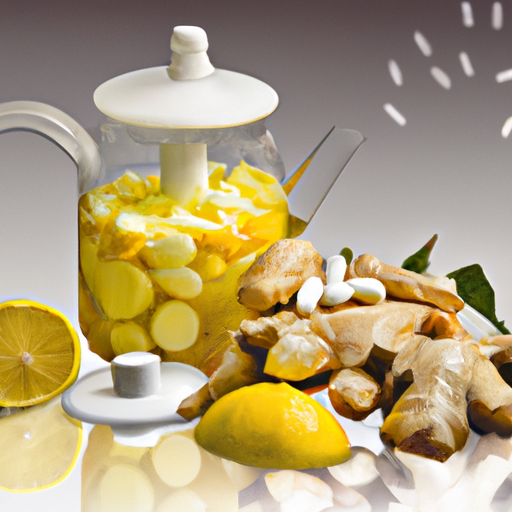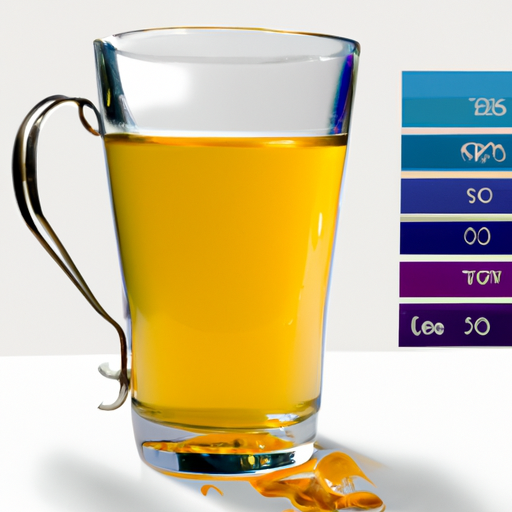If you have recently had surgery, you might notice swelling and inflammation near the surgical site. Although this is a normal part of the healing process, it can cause discomfort and pain.
Fortunately, there are natural remedies that can help reduce swelling and inflammation, including turmeric. Turmeric has been used for centuries in traditional medicine, and many people believe it can help reduce inflammation and promote healing after surgery.
But does it really work? In this article, we’ll explore the scientific evidence behind turmeric’s anti-inflammatory properties and examine whether it can help with swelling after surgery.
Key Takeaways
- Turmeric has been used for centuries in traditional medicine to reduce inflammation and promote healing after surgery.
- Turmeric contains curcumin, which has potent anti-inflammatory and antioxidant properties and can inhibit the production of inflammatory molecules, block certain inflammatory pathways, and decrease the expression of genes that promote inflammation.
- Taking turmeric supplements can reduce pain and improve mobility after surgery, with most studies using doses between 500-2,000 milligrams per day.
- It’s important to inform your doctor about any supplements or herbal remedies you’re taking, especially if you’re taking medications for chronic conditions or have a history of surgery, as turmeric supplements may interact with certain medications and increase the risk of bleeding and bruising.
Understanding Swelling and Inflammation After Surgery
If you’ve recently undergone surgery, you may be wondering why you’re experiencing swelling and inflammation in the first place. Swelling is a normal bodily response to injury or trauma, and it is a result of increased blood flow to the affected area. This increased blood flow brings with it white blood cells and other substances that help to fight off infection and repair damaged tissue.
Inflammation, on the other hand, is a more complex process that involves a cascade of chemical reactions in the body. It’s a necessary process for healing, but it can also be uncomfortable and lead to complications if not managed properly.
Swelling management techniques include applying ice, elevating the affected area, and taking over-the-counter anti-inflammatory medications. Common causes of post-surgery inflammation include the body’s response to the surgical trauma, as well as the presence of foreign objects such as sutures or implants.
It’s important to follow your doctor’s instructions for managing swelling and inflammation after surgery to ensure proper healing. Now, let’s explore the potential benefits of turmeric in reducing swelling and inflammation.
What is Turmeric?
Turmeric is a vibrant yellow spice commonly used in Asian cuisine. It has been used for centuries in traditional medicine to treat a variety of health conditions such as pain, inflammation, and digestive issues. Turmeric contains a compound called curcumin, which has potent anti-inflammatory and antioxidant properties.
Turmeric benefits are not limited to just its anti-inflammatory properties. It’s also known to have antibacterial, antiviral, and anticancer properties. Turmeric usage has been studied extensively in various clinical trials and has been found to be effective in reducing inflammation in conditions such as osteoarthritis, rheumatoid arthritis, and inflammatory bowel disease.
With its numerous health benefits, turmeric has become a popular natural remedy for many health conditions. As you move on to the subsequent section about the science behind turmeric’s anti-inflammatory properties, you’ll learn how curcumin works to reduce inflammation in the body.
The Science Behind Turmeric’s Anti-Inflammatory Properties
As you delve into the science behind turmeric’s anti-inflammatory properties, you’ll discover that curcumin, the main active ingredient in turmeric, plays a significant role in reducing inflammation in the body.
Studies have shown curcumin to be a powerful antioxidant and anti-inflammatory agent, which can help alleviate symptoms of chronic inflammation.
Additionally, turmeric has other potential benefits, such as improving brain function and reducing the risk of heart disease.
Role of Curcumin in Reducing Inflammation
Like a superhero, curcumin swoops in to fight inflammation and has been shown to be effective in reducing swelling after surgery. Curcumin is the active ingredient in turmeric that gives it its therapeutic properties. It works by inhibiting the production of inflammatory molecules in the body, which reduces inflammation and pain. Curcumin also has antioxidant properties that help to protect cells from damage caused by free radicals.
Here are four ways in which curcumin reduces inflammation:
- Curcumin inhibits the production of enzymes that contribute to inflammation.
- Curcumin blocks the activation of certain inflammatory pathways in the body.
- Curcumin decreases the expression of genes that promote inflammation.
- Curcumin increases the activity of proteins that inhibit inflammation.
While curcumin has been shown to be effective in reducing inflammation, it’s important to note that it can also have potential side effects. These can include gastrointestinal symptoms such as nausea and diarrhea, as well as interactions with certain medications. As with any supplement, it’s important to speak with your healthcare provider before taking curcumin.
As we move on to the next section about other potential benefits of turmeric, it’s important to keep in mind the therapeutic properties of curcumin and its potential side effects.
Other Potential Benefits of Turmeric
With its vibrant orange hue and warm, earthy aroma, this ancient spice has been used for centuries in traditional medicine and cooking, and recent research suggests that it may have a variety of potential health benefits beyond reducing inflammation. Turmeric, commonly used in Indian and Middle Eastern cuisine, is also available in the form of supplements and has been studied for its potential antioxidant and anti-cancer properties. In addition to its medicinal properties, turmeric also adds flavor and color to dishes. Here are some easy turmeric recipes to try at home:
| Recipe | Ingredients | Directions |
|---|---|---|
| Golden Milk | 1 cup milk (dairy or non-dairy), 1 tsp turmeric, 1/2 tsp cinnamon, 1/2 tsp ginger, 1 tsp honey | Warm the milk in a small saucepan over low heat. Add the spices and honey and stir until well combined. Enjoy warm. |
| Turmeric Roasted Vegetables | 1 lb mixed vegetables (such as carrots, cauliflower, and sweet potatoes), 2 tbsp olive oil, 1 tsp turmeric, 1/2 tsp paprika, salt and pepper to taste | Preheat oven to 425°F. Cut vegetables into bite-sized pieces and toss with olive oil, turmeric, paprika, salt, and pepper. Spread in a single layer on a baking sheet and roast for 20-30 minutes, until tender and golden brown. |
| Turmeric Tea | 1 cup water, 1/4 tsp turmeric, 1 slice fresh ginger, 1 tsp honey | Bring water, turmeric, and ginger to a boil in a small saucepan. Reduce heat and simmer for 5 minutes. Remove from heat, strain, and stir in honey. Serve hot. |
| Turmeric Smoothie | 1 banana, 1 cup frozen pineapple, 1/2 cup coconut milk, 1/2 tsp turmeric, 1 tbsp chia seeds | Blend all ingredients together until smooth. Enjoy chilled. |
While there is limited evidence regarding turmeric’s effectiveness in reducing swelling after surgery, many people still turn to this healing spice in the hopes of finding relief. In the next section, we will explore the current evidence for this practice.
Evidence for Turmeric’s Effectiveness in Reducing Swelling After Surgery
You can find some studies that suggest turmeric may be the key to unlocking your body’s floodgates and reducing the swelling after surgery, like a natural dam-breaker. Here are some evidence-based findings that may help you decide whether to incorporate turmeric into your post-surgery recovery plan:
-
Turmeric has anti-inflammatory properties, which can help reduce swelling and inflammation after surgery.
-
Some studies have found that taking turmeric supplements can reduce pain and improve mobility after surgery.
-
The recommended turmeric dosage varies depending on the form of turmeric you take, but most studies have used doses between 500-2,000 milligrams per day.
-
When selecting a turmeric supplement, look for products that contain black pepper extract, as it can help increase the absorption of turmeric in the body.
As you consider incorporating turmeric into your post-surgery recovery plan, it’s important to consult with your healthcare provider to ensure that it’s safe for you to do so.
In the next section, we’ll explore some ways to include turmeric in your diet and overall recovery plan.
How to Incorporate Turmeric into Your Post-Surgery Recovery Plan
Now that we’ve established the effectiveness of turmeric in reducing swelling after surgery, it’s time to incorporate it into your post-surgery recovery plan.
One way to do this is by adding turmeric to your post-surgery diet. Turmeric can be incorporated into a variety of dishes, including soups, stews, and curries. Additionally, you can sprinkle turmeric onto roasted vegetables or add it to smoothies for a boost of anti-inflammatory properties.
There are also many turmeric recipes available online that can help you incorporate this powerful spice into your meals. Some popular options include turmeric milk, turmeric tea, and turmeric-infused hummus.
By incorporating turmeric into your post-surgery diet, you can help reduce inflammation and promote faster healing.
Moving forward, it’s important to note that while turmeric can be an effective natural remedy for swelling after surgery, there are also other natural remedies to consider. Let’s explore some of these options in the next section.
Other Natural Remedies for Swelling After Surgery
Exploring natural remedies can be like discovering hidden treasures to accelerate your post-surgery recovery. Herbal remedies and home remedies have been used for centuries to reduce swelling after surgery.
For instance, ginger has anti-inflammatory properties that can help reduce swelling and pain. Garlic contains allicin, which has anti-inflammatory and antioxidant properties that can help reduce swelling and promote healing. Cayenne pepper contains capsaicin, which can help reduce pain and inflammation.
Other natural remedies for swelling after surgery include arnica, bromelain, and turmeric. Arnica is a plant that has been used for centuries to reduce swelling and bruising. Bromelain is an enzyme found in pineapples that can help reduce inflammation and swelling. Turmeric, which has been extensively researched for its anti-inflammatory properties, can also help reduce swelling after surgery.
However, it’s important to consult with your healthcare provider before using any herbal remedies or home remedies to ensure they’re safe and effective for you.
In the next section, we’ll explore traditional medicines and practices from around the world that can also help with post-surgery recovery.
Traditional Medicines and Practices from Around the World
Traveling back in time, let’s delve into how different cultures and traditions have utilized their unique methods of healing to aid in postoperative recovery. Herbal remedies have been a common practice in many cultures for centuries.
In China, the use of traditional Chinese medicine (TCM) is widely accepted, and herbs like ginseng and astragalus are believed to have anti-inflammatory properties that can help reduce swelling after surgery. Ayurvedic medicine, which originated in India, also utilizes a variety of herbs and spices, including turmeric, to aid in postoperative healing.
Cultural traditions also play a role in postoperative recovery. In Japan, for example, the practice of shinrin-yoku, or forest bathing, is believed to have healing properties that can reduce stress and inflammation. Similarly, in many Indigenous cultures, traditional healing practices like smudging and sweat lodges are believed to aid in physical and emotional healing.
While these practices may not have the same level of scientific evidence as traditional medicine, they offer unique insights into the ways different cultures approach postoperative recovery.
As you move on to the next section about the role of diet and exercise in reducing swelling after surgery, it’s important to remember that the use of herbal remedies and cultural traditions should always be discussed with your healthcare provider to ensure safety and effectiveness.
The Role of Diet and Exercise in Reducing Swelling After Surgery
Maintaining a healthy diet and exercise routine post-surgery can significantly improve your recovery process, leaving you feeling stronger and more empowered. In addition to reducing your risk of developing complications, a balanced diet and regular exercise can also help to reduce swelling and inflammation.
Here are four diet modifications and exercise routines that can help speed up your recovery and reduce post-surgical swelling:
- Increase your protein intake to help your body repair and rebuild tissues.
- Incorporate anti-inflammatory foods such as leafy greens, berries, and fatty fish into your diet.
- Engage in light exercise such as walking and stretching to improve circulation and reduce swelling.
- Gradually increase the intensity of your exercise routine as you heal, under the guidance of your healthcare provider.
By making these simple changes, you can help to reduce swelling and improve your overall recovery process. However, it’s important to consult with your healthcare provider before starting any new diet or exercise routines post-surgery.
In the next section, we’ll discuss precautions and risks associated with post-surgical recovery.
Precautions and Risks
Before taking turmeric supplements or any other herbal remedies, it’s important to consider the potential interactions with any medications you may be taking. Some medications, such as blood thinners or diabetes drugs, can be affected by turmeric.
If you experience any unexpected side effects or your symptoms do not improve, it’s important to consult with your doctor to ensure that there are no underlying issues.
Interactions with Medications
Taking turmeric supplements may interact with certain medications, increasing the risk of bleeding and bruising in up to 40% of patients. Turmeric has antiplatelet effects, which means it can make blood thinner and reduce clotting. Therefore, if you’re taking blood-thinning medications like warfarin, aspirin, or clopidogrel, it’s important to consult with your doctor before taking turmeric supplements.
Turmeric may also interact with medications that are metabolized by certain enzymes in the liver, such as cytochrome P450. This can affect the effectiveness of these drugs and cause adverse effects. Your doctor may need to adjust the dosage of your medications or monitor your liver function if you take turmeric supplements.
To avoid potential drug interactions, it’s crucial to inform your doctor about any supplements or herbal remedies you’re taking. This is especially important if you’re taking medications for chronic conditions or have a history of surgery.
When to Consult Your Doctor
If you experience any unusual symptoms or side effects while using turmeric supplements, it’s important to consult your doctor. While turmeric is generally safe for most people, excessive swelling after surgery can be a sign of a serious complication.
If you notice any of the following signs and symptoms of excessive swelling, it is important to seek medical attention right away:
- Pain or tenderness in the affected area
- Redness or warmth around the surgical site
- Increasing swelling or puffiness that doesn’t improve with rest or elevation
- Difficulty moving the affected limb or joint
- Numbness or tingling in the affected area
Your doctor may recommend additional treatments or interventions to manage swelling after surgery, such as compression stockings, lymphatic massage, or medication.
If you have any concerns or questions about using turmeric supplements to reduce swelling after surgery, talk to your doctor before starting any new treatment or supplement regimen.
Frequently Asked Questions
Can turmeric be used as a replacement for prescription medication for swelling after surgery?
While turmeric benefits are widely known, it’s not recommended to use it as a replacement for prescription medication for swelling after surgery. Natural remedies can complement medical treatment, but it’s best to consult with your doctor first.
Are there any side effects to using turmeric for swelling after surgery?
Before taking turmeric, it’s important to understand the potential risks and precautions. Turmeric dosage should be monitored closely, and the effectiveness of turmeric remains debated. Side effects may include gastrointestinal issues and allergic reactions. Consult with a healthcare professional before use. Turmeric dosage, Precautions & Risks: A Discussion. Effectiveness of turmeric: Debating the Evidence.
How long does it typically take for turmeric to reduce swelling after surgery?
Turmeric dosage and timing can affect effectiveness in reducing post-surgery swelling, according to studies. Combining turmeric with other anti-inflammatory ingredients may have pros and cons for recovery. Formal, technical evidence supports the use of turmeric for post-surgery inflammation.
Is it safe to use turmeric for swelling after surgery if I have a history of liver or kidney problems?
"Turmeric has been shown to have potential interactions with medications and may worsen liver or kidney problems. It is important to consult with a healthcare provider before using turmeric for swelling after surgery."
Can turmeric be taken in conjunction with other natural remedies for swelling after surgery?
When managing postoperative swelling, combining turmeric with other supplements may provide benefits, but also has potential drawbacks. Evidence supports turmeric’s use as a natural anti-inflammatory after surgery. Consult with your healthcare provider for personalized recommendations.
Conclusion
Congratulations, you’ve just learned about the potential benefits of turmeric in reducing swelling after surgery. While there’s ongoing research in this field, the scientific evidence so far suggests that turmeric’s anti-inflammatory properties may indeed aid in the healing process.
However, it’s important to note that turmeric isn’t a substitute for medical treatment and should be used in conjunction with proper post-surgery care. As you consider incorporating turmeric into your post-surgery recovery plan, remember to consult with your healthcare provider to ensure that it’s safe and effective for your particular case.
Other natural remedies, traditional medicines, and dietary and exercise practices may also be helpful in reducing swelling and promoting healing. Ultimately, taking a holistic approach to your recovery can help you achieve optimal results and get back to your normal activities as quickly and safely as possible.
In conclusion, the potential benefits of turmeric in reducing swelling after surgery are promising, and incorporating this natural remedy into your recovery plan may be a good option. However, it’s important to continue following proper medical care and to consult with your healthcare provider before trying any new treatments.
As you embark on your post-surgery recovery journey, remember to prioritize your health and wellbeing, and explore the many different tools and techniques that can help you achieve optimal healing.










